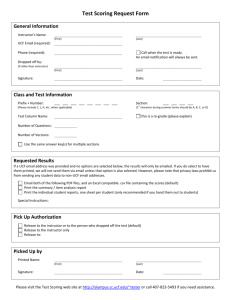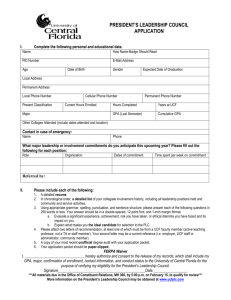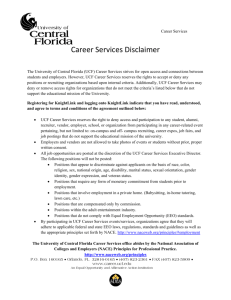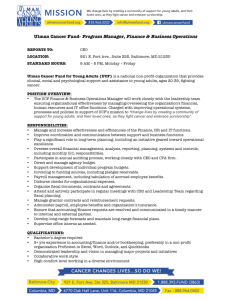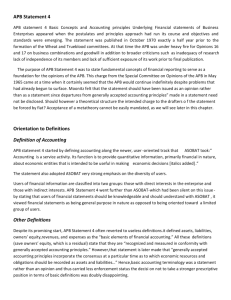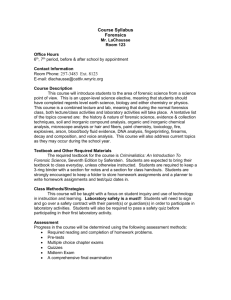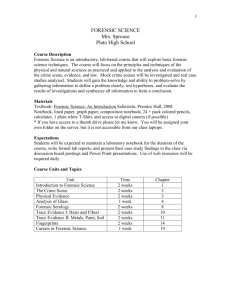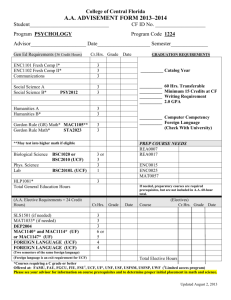SOW 3111 Syllabus Spring 2010 - University of Central Florida
advertisement
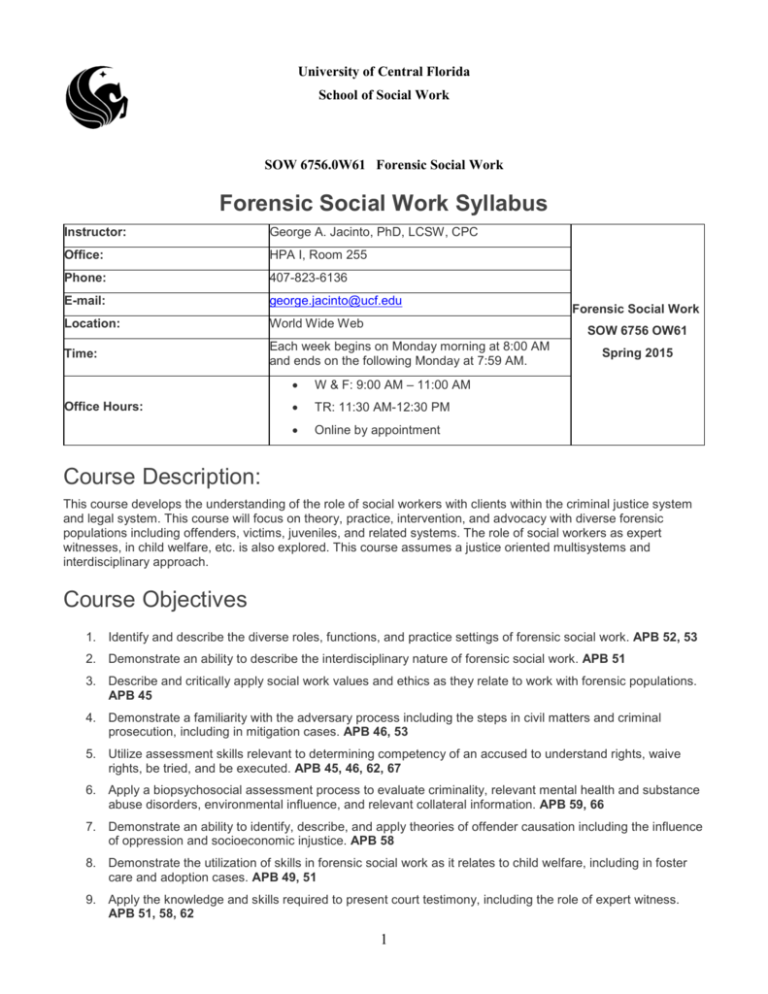
University of Central Florida School of Social Work SOW 6756.0W61 Forensic Social Work Forensic Social Work Syllabus Instructor: George A. Jacinto, PhD, LCSW, CPC Office: HPA I, Room 255 Phone: 407-823-6136 E-mail: george.jacinto@ucf.edu Location: World Wide Web Time: Each week begins on Monday morning at 8:00 AM and ends on the following Monday at 7:59 AM. Office Hours: Forensic Social Work SOW 6756 OW61 • W & F: 9:00 AM – 11:00 AM • TR: 11:30 AM-12:30 PM • Online by appointment Spring 2015 Course Description: This course develops the understanding of the role of social workers with clients within the criminal justice system and legal system. This course will focus on theory, practice, intervention, and advocacy with diverse forensic populations including offenders, victims, juveniles, and related systems. The role of social workers as expert witnesses, in child welfare, etc. is also explored. This course assumes a justice oriented multisystems and interdisciplinary approach. Course Objectives 1. Identify and describe the diverse roles, functions, and practice settings of forensic social work. APB 52, 53 2. Demonstrate an ability to describe the interdisciplinary nature of forensic social work. APB 51 3. Describe and critically apply social work values and ethics as they relate to work with forensic populations. APB 45 4. Demonstrate a familiarity with the adversary process including the steps in civil matters and criminal prosecution, including in mitigation cases. APB 46, 53 5. Utilize assessment skills relevant to determining competency of an accused to understand rights, waive rights, be tried, and be executed. APB 45, 46, 62, 67 6. Apply a biopsychosocial assessment process to evaluate criminality, relevant mental health and substance abuse disorders, environmental influence, and relevant collateral information. APB 59, 66 7. Demonstrate an ability to identify, describe, and apply theories of offender causation including the influence of oppression and socioeconomic injustice. APB 58 8. Demonstrate the utilization of skills in forensic social work as it relates to child welfare, including in foster care and adoption cases. APB 49, 51 9. Apply the knowledge and skills required to present court testimony, including the role of expert witness. APB 51, 58, 62 1 10. Demonstrate an ability to identify, describe best practices and evidence-based interventions with the offender and victim populations, including victims of elder abuse. APB 57, 66 11. Demonstrate an understanding of the role of forensic social workers with juvenile defendant and offender populations. APB 51, 53, 58, 62 12. Demonstrate an understanding of the role for forensic social work with immigrant, refugee and LGBT populations. APB 51, 58, 62 Competency Practice Behavior Course Objectives Assignment APB 45 Apply ethical decision-making skills to issues specific to communitybased clinical practice work 3, 5, Strengths-Based Assessment (SBA) Academic Journal (AJ) Final Paper (FP) APB 46 Identify and use knowledge of relationship dynamics including power differentials 4, 5, SBA AJ FP APB 51 Communicate professional judgments to other social workers and to professionals from other disciplines in both verbal an written format 2. 8, 9, 11, 12 AJ FP APB 52 Research and apply knowledge of diverse populations to enhance client wellbeing 1 Annotated Bibliography (AB) AJ FP APB 53 Work effectively with diverse populations 1, 4, 11 SBA AJ FP APB 58 Synthesize and differentially apply theories of human behavior and the social environment to guide clinical practice 7, 9, 11, 12 AB AJ FP APB 59 Use bio-psychosocial-spiritual theories and systems in formulation of comprehensive assessments 6 SBA AJ FP 2.1.2 Apply social work ethical principles to guide professional practice 2.1.3 Apply critical thinking to inform and communicate professional judgments 2.1.4 Engage diversity and difference in practice 2.1.7 Apply knowledge of human behavior and the social environment 2 APB 62 Assess the quality of clients’ interactions within their social contexts 5, 9, 11, 12 AB SBA AJ APB 66 Use bio-psychosocial-spiritual assessment tools that are evidence-based and culturally sensitive 6, 10 SBA AJ FP APB 67 Assess clients’ readiness for change 5 SBA AB AJ FP Required Text • Maschi, T., Bradley, C., & Ward, K. (Eds.) (2009). Forensic social work: Psychosocial and legal issues in diverse practice settings. New York, NY: Springer Publishing. • American Psychological Association (2010). Publication Manual of APA (6th Edition). Washington, DC: American Psychological Association. Supplemental Readings Throughout the course there are supplemental readings (either from books or journals) that have been identified to provide you with a perspective beyond the textbook. All required supplemental readings are listed by week in the course schedule or are included directly in the module materials. The instructor will either provide the citation for the article or may provide the article. It will be your responsibility to access these readings through the UCF library and/or check the webcourse media center for these articles. Library Resources Students will be expected to utilize UCF library resources to evidence and support their course work. The UCF Libraries has a full array of paper and electronic resources available for students and their research needs. The following web sites which can help students find information, navigate through databases and learn how to use the library: 1. Library Instruction sessions - http://library.ucf.edu/Reference/Instruction 2. Library Research Tutorials - http://library.ucf.edu/Reference/Instruction/LIToursTutorials.asp 3. Streaming videos - http://library.ucf.edu/Reference/Videos/Default.asp 4. Research Guides - http://library.ucf.edu/Reference/Guides/ 5. Ask a Librarian service - http://library.ucf.edu/Ask/ 6. Consult with the librarian familiar with Social Work – Mr. Hal Mendelsohn In addition to paper copies of books and journals, UCF students have the ability to access a vast selection of journals and books in electronic format while on or off campus. The web address to the library's catalog is http://library.ucf.edu/. The Ask A Librarian service provides students the ability to contact a library professional either by phone, on-line chat or email, and ask for assistance on "how to" locate, research, and obtain library materials. The web address for Ask A Librarian is http://library.ucf.edu/Ask/. A series of streaming videos, showing students how to search for a book or journal article, has been developed and are available at http://library.ucf.edu/Reference/Videos/Default.asp. Research Guides for different majors, that list books, journals, databases, and web sites have been developed and are available in electronic format 3 at http://library.ucf.edu/Reference/Guides/. Another service to help students conduct library research is a Research Consultation. After a student has conducted his/her research and is in need of additional information, s/he can work with a librarian to locate material with the help of his/her expert searching capabilities. To set-up a Research Consultation, students should complete an on-line Research Consultation request, available at http://library.ucf.edu/Reference/ResearchConsultations/Default.asp. This method is the preferred one, as it captures full information about student needs; or, contact the Research Office at (407) 823-3379. Students may also contact the Ask-a-Librarian Service via the link above, or call the Ask-a-Librarian Desk at (407) 823-5880. Finally, students may choose to visit the library and ask a Reference Librarian how best to conduct one's research. If a student has a simple question on how to locate either a book or journal title, the UCF Reference Librarians are happy to provide this type of service, too. Online Resources All assignments will be turned in electronically via webcourses2@UCF. Please also note that all email should be sent through the webcourse section. Turnitin.com All written assignments will be submitted via the online course section (webcourses2@UCF) and will be evaluated via turnitin.com; an online system that can determine if work has been copied from another source. Course Requirements *In the beginning of the course each student will sign up for a specific area of interest, based on 4 key areas/populations of social work (victims, adult offenders, juvenile offenders, immigrant groups). It will be expected that students will then organize the following assignments around their specific area of interest: Annotated Bibliography, FSW Intervention Paper, Academic Journal, and Final Paper. Annotated Bibliography (10 points) *Due February 1, 2015 The purpose of this assignment is to assist you in identifying and synthesizing peer reviewed articles that are relevant to Forensic Clinical Social Work. You will be completing a Psycho-social-spiritual Assessment, Competency Evaluation, and Population Paper during the semester. Please focus your Bibliography around your area of interest as you will be using these references in your various assignments. You will include peer reviewed articles, multimedia sources, and social networking resources. APB 52, 58, 62, 67 Population Paper (20 points) Due March 1, 2015 The purpose of this paper is to allow the student the opportunity to research and prepare a research paper on forensic clinical social work roles, theory, and practice with a specific population. This paper assumes a multi-level (two pronged and PIE) perspective; asking students to consider social work practice with a population from the individual, family and macro systems levels that are important in work with clients in the sociolegal environment. This analysis will utilize the comprehensive materials covered throughout the semester, including: the text, the modules, and external materials and the student's own research in the form of books, program descriptions, law resources (policy), peer reviewed journals, multimedia sources, and social networking resources. You are expected to support your assertions, conclusions, and recommendations and citing appropriately. Your language should be free of bias. Use highlighted areas of the outline below as subheadings in your paper. APB 45, 46, 52, 53, 59, 62, 66, Strengths-Based Bio-Psycho-Social-Spiritual Assessment (30 points) *Due March 22, 2015 The purpose of this paper is to allow you to demonstrate your ability to construct a bio-psycho-social-spiritual assessment of a person involved in the criminal justice system. Refer to Assignment in Canvas for outline of the paper and other details. APB 45, 46, 52, 53, 59, 62, 66, 4 Academic Journal (AJ) (10 points) *Due April 12, 2015 You will keep a weekly journal that memorializes your journey this semester that includes: key ideas, insights, and skill development. The journal is uniquely your own and will be worth 10 points. There will be no rubric for this assignment. On April 14, 2014, I will collect the journals and scan them to verify that you made weekly entries and that the entries are a running account of your learning. You may use the Reflection questions that I include in each of the Weekly Notes found under the Modules tab. The Final Paper asks you to provide an overview of your learning for the semester. Your astute use of this Academic Journal assignment will assist you in preparing the material you will need to successfully complete the Final Exam. Plan ahead. APB 45, 46, 51, 53, 58, 59, 62, 66, 67 Final Paper (FP) (30 points) *Due April 26, 2015 The final exam allows you to demonstrate the highlights of your learning this semester. This is why you have maintained an academic journal for the semester. The final exam will be written as an essay that outlines your key insights from the semester and how you would use in forensic social work practice in your work. Please use subheadings in your paper. I have given you two ideas here. Note the Bold words in my subheading list or use the subheadings you find in the rubric. Please read the rubric carefully. My suggestion is that before you start writing the paper you place the subheadings first and then you will not leave out any of the key parts of the paper. APB 45, 46, 51, 53, 58, 59, 62, 66, 67 Missed Assignments/Make-Ups/Extra Credit Students are expected to plan ahead in order to meet assignment due dates. All assignments must be turned in by the due date and time indicated in the schedule. Late assignments will lose a full letter grade (this means the equivalent of A to a B drop in grade) for each week (If turned in 2 days late the assignment is still subject to a week’s point deduction, if 9 days late this would equal two week’s point deduction) that they are late unless the student gained prior approval from the instructor due to an extreme emergency. No assignment will be accepted after week 15 of class. It is the student’s responsibility to make arrangements with the instructor regarding late assignments. This policy applies to all late assignments except in EXTREME emergencies which must be documented. Students are expected to plan ahead in order to submit assignments and participate in discussion boards within the time allowed in the webcourse. It is the student’s responsibility to make arrangements with the instructor regarding late assignments or exams in the case of an EXTREME emergency. Examples of extreme emergency include death or serious family injury, and exceptional health emergencies. No extra credit is given in this course. Evaluation and Grading Assignment Percentage of Grade Annotated Bibliography 10% Population Paper 20 Strengths-Based Paper 30 Academic Journal 10% Final Paper 30% Total 100% Letter Grade Points 5 A 90-100 Points B 80-89 Points C 70-79 Points D 60-69 Points F 59 and below Attendance Policy Students are expected to log into the webcourse each week. Participation is based upon ongoing course activity, as demonstrated by the completion of module materials and course assignments. It is the student's responsibility to log in weekly to keep up with course readings and materials. Written Assignments Effective written communication skills are essential to professional social work practice. Thus, students are expected to present their ideas clearly and properly and to adhere to accepted standards of writing. Grammar, punctuation, and spelling are to be correct in all written materials submitted and will be considered in grading written assignments. All written assignments must adhere to APA 6th edition. Assignments must be typed in a 12font print, and all margins must be one inch. The cover page of a paper does not count towards page number requirements, nor do reference pages. References should be included in the APA 6th edition citation and reference style. Work not conforming to these standards or demonstrating serious deficiencies in common English usage will be returned ungraded. Students are encouraged to use the University Writing Center (UWC) for assistance in preparing written assignments. The UWC is located in MOD 608 (near the Communications Building). UWC staff may be reached at (407) 823-2197 or http://www.uwc.ucf.edu/. The assignments will emphasize the integration of interviewing, verbal, conceptualization and writing skills in practice. All assignments will be evaluated and graded on the following criteria. 1. Appropriate use of APA writing style. 2. Adequate number of references cited in appropriate APA (6th edition) format. 3. Organization and clarity of ideas presented. 4. Ability to integrate theory and practice appropriately. 5. Ability to use analytical skills throughout the assignment. 6. Creative ways of responding to the instructions beyond the requirements. Incomplete Grades In exceptional circumstances, an incomplete grade may be given per School and University policies. Individual arrangements must be made with the instructor for the completion of the course requirements, but in no case will the date set extend beyond the end of the following semester. Students who experience chronic medical or personal problems that prevent them from attending class regularly are encouraged to review policies relating to securing a leave of absence from their university studies. 6 Academic Integrity/Plagiarism Social workers must demonstrate high standards of integrity. Every student is expected to do his or her own work (some group work will be allowed- you will receive instructions on these assignments) and all of the work produced will be expected to be completed in its entirety by the student who turns it in. Cheating and plagiarism will not be tolerated. Any acts of plagiarism, including not acknowledging sources of information appropriately and in accordance with APA guidelines, may result in a failing grade in the course. School and University policies on academic integrity will be strictly enforced. Students found to have cheated or plagiarized will receive no credit for the exam or assignment, receive a failing grade for the course and may be subject to appropriate referral to the Office of Student Conduct for further action. (See the UCF Golden Rule for further information.). Students who observe others violate this policy are expected to report this to the instructor. Professional Behavior Unprofessional behavior will not be tolerated; this includes rude or disrespectful comments via webcourse tools, or interactions with classmates or the instructor; biased or prejudiced language towards any of the populations served by social work. Should a student exhibit unprofessional behavior the instructor will deduct a point from their overall course grade (per module unit week). Should a disruption continue past the instructor addressing it the first time the student will be referred to the MSW Coordinator and the Office of Student Conduct. Please note that you are considered burgeoning professionals and are expected to treat your colleagues with respect. Academic Honesty Plagiarism and Cheating of any kind on an examination, quiz, or assignment will result at least in an "F" for that assignment (and may, depending on the severity of the case, lead to an "F" for the entire course) and may be subject to appropriate referral to the Office of Student Conduct for further action. See the UCF Golden Rule for further information. I will assume for this course that you will adhere to the academic creed of this University and will maintain the highest standards of academic integrity. In other words, don't cheat by giving answers to others or taking them from anyone else. I will also adhere to the highest standards of academic integrity, so please do not ask me to change (or expect me to change) your grade illegitimately or to bend or break rules for one person. Disability Statement The University of Central Florida is committed to providing reasonable accommodations for all persons with disabilities. This syllabus is available in alternate formats upon request. Students with disabilities who need accommodations in this course must contact the professor at the beginning of the semester to discuss needed accommodations. No accommodations will be provided until the student has met with the professor to request accommodations. Students who need accommodations must be registered with Student Disability Services, Student Resource Center Room 132, phone (407) 823-2371, TTY/TDD only phone (407) 823-2116, before requesting accommodations from the professor. Student Instructor Communication The instructor is available to meet with students during the office hours listed on this syllabus and by appointment. The instructor can be contacted by phone or email with the contacts listed at the top of the syllabus. Email should in most cases be directed through the webcourse section. • In most cases email will be answered within 24 hours (M-F), however allow up to 48 hours for a response. 7 • If you send an email on Friday afternoon, Saturday or Sunday please be aware that you may not receive a response until Monday. • If sending an email to George.jacinto@ucf.edu include SOW6756 in the subject line of your email. • It is your responsibility to initiate contact with the instructor about due date extensions or other concerns related to emergencies. • The instructor will communicate any changes to the syllabus via the webcourse email or announcements; therefore it is your responsibility to regularly check the webcourse. E-mail E-mail will be an integral part of this course. Make sure: 1. All email should be sent through the webcourse email function. 2. Check your webcourse e-mail at least twice per week (more often is better). 3. Include "Subject" headings: use something that is descriptive and refer to a particular assignment or topic. 4. Be courteous and considerate. Being honest and expressing yourself freely is very important but being considerate of others online is just as important as in the classroom. 5. Make every effort to be clear. Online communication lacks the nonverbal cues that fill in much of the meaning in face-to-face communication. 6. Do not use all caps. This makes the message very hard to read and is considered "shouting." Check spelling, grammar, and punctuation (you may want to compose in a word processor, then cut and paste the message into the discussion or e-mail). 7. Break up large blocks of text into paragraphs and use a space between paragraphs. 8. Sign your e-mail messages. 9. Never assume that your e-mail can be read by no one except yourself; others may be able to read or access your mail. Never send or keep anything that you would not mind seeing on the evening news. Viruses A virus can spell disaster. Your use of a reputable anti-virus program is a requirement for participation in this course (good ones include McAfee or Norton). Also, back up your files: "My hard drive crashed." "My modem doesn't work." "My printer is out of ink." These are today's equivalents of "My dog ate my homework." And these events really do occur and they are really inconvenient when they do. However, these are not valid excuses for failing to get your work in on time. Technical Resources For specific problems in any of the areas below or for further information go to the corresponding link for assistance. 2 BEFORE ME RULE: I will expect you to check with resources to attempt to solve technical issues with webcourses prior to contacting me for assistance. I will often have to refer you to one of these resources anyway so it is best to start with them. • UCF Home Page will help find UCF resources • UCF Computer Service Desk You can also call the Service Desk at 407-823-5117. • Learning Online This site provides information on study skills for distance learners, the library and the writing center. 8 • • • • computer or upgrading your current equipment http://www.cstore.ucf.edu/ Hardware/Software Requirements Technical Discussion Topic: If you have technical questions and/or problems, please post a message to the Technical Discussion Topic. I encourage members of the class who are technically proficient to also monitor this discussion topic and assist your classmates. If your equipment problems prevent you from using e-mail from home, there are many computer labs on campus and virtually every public library offers Internet access. Note: All dates and times are subject to change by the course professor. Be informed and routinely check the Schedule and Class Discussion topics for any changes or updates. Schedule Week/Dates Topic Week 1 Forensic Social Work Defined: Collaborative Roles in Forensic Social Work and History Week 2 Social Work Ethics with Forensic Populations, a Social Justice Systems Perspective Week 3 Civil and Criminal Law: Court System; Mitigation (Death Penalty); Role of Expert Witness Week 4 Week 5 Week 6 Week 7 Week 8 Week 9 Week 10 Week 11 Assignments Due Dates Readings: Maschi, Bradley & Monday Ward (2009), Chapters 1 & 2 (pp. January 12 3-19) Readings: Maschi, Bradley & Tuesday Ward (2009), Chapter 3 & 23 (pp. January 20 21-33 & 313-322) (Monday is a holiday) Readings: Maschi, Bradley & Monday Ward (2009), Chapter 4 (pp. 35- January 26 50) Annotated Bibliography - Due: February 1 Assisting Families Through Readings: Maschi, Bradley & Forensic Roles Ward (2009), Chapters 6 & 7 (pp. 63-93). Victims of Violence and Readings: Maschi, Bradley & Abuse Ward (2009), Chapters 8 & 9 (pp. 95-117) Role in Child Welfare Readings: Maschi, Bradley & Ward (2009), Chapters 12 & 13 (pp. 151-179) Mental Health, Substance Readings: Maschi, Bradley & Abuse, Programming & Ward (2009), Chapters 14 & 15 Prisons (pp. 183-207) Prepare for - Population Paper – Due: March 1 Reentry Issues: Planning Readings: Maschi, Bradley & and Preplanning for Ward (2009), Chapter 20 (pp. Success on the Outside 275-287) Restorative Justice: Human Readings: Maschi, Bradley & Rights Issues Ward (2009), Chapter 22 (pp. 299-310) Prepare for Assignment Strengths-Based Bio-psycho-social-spiritual assessment Due: March 22 9 Monday February 2 Monday February 9 Monday February 16 Monday February 23 Monday March 2 Monday March 9 Monday March 16 • Week 12 Juvenile Justice and Social Readings: Maschi, Bradley & Work Roles and Practice Ward (2009), Chapters 10, 11 & within Juvenile Justice 18 (pp. 121-148 & 231-251) Monday March 23 Buying a new School as a practice setting in the prevention and reentry of juvenile offenders. Weeks 13 & Women in Prison, SMI, Readings: Maschi, Bradley & Monday 14 Immigrants and Refugees. Ward (2009), Chapters 16, 24, & March 30and 25 (pp. 209-217 & 323-347) April 6 Prepare for Assignment Academic Journal Due: April 12 Week 15 Week 16 Best Practices & Evidence Based Practice with Forensic Populations Prepare for Assignment FINAL PAPER DUE Readings: Maschi, Bradley & Monday Ward (2009), Chapter 26 (pp. April13 349-360) Final Paper Due: April 26 Best Wishes as you graduate or enter your Summer break! Copyright This course may contain copyright protected materials such as audio or video clips, images, text materials, etc. These items are being used with regard to the Fair Use doctrine in order to enhance the learning environment. Please do not copy, duplicate, download or distribute these items. The use of these materials is strictly reserved for this online classroom environment and your use only. All copyright materials are credited to the copyright holder. 10 References Ashford, J. B. (2009). Overview of forensic social work: Broad and narrow definitions. In Social workers’ desk reference. 2d ed. Edited by A. R. Roberts, 1055–1060. New York: Oxford Univ. Press. Austin, A. M., MacGowan, J. J., & Wagner, E. F. (2005). Effective family-based interventions for adolescents with substance use problems: A systematic review. Research on Social Work Practice, 15(2), 67-83. Barker, R. L., and D. M. Branson. (2003). Forensic social work: Legal aspects of professional practice (2nd ed.) Binghamton, NY: Haworth. Barnett, O., Miller-Perrin, C. L., & Perrin, R. D. (2005). Family violence across the lifespan: An introduction (2nd ed.). London, UK: Sage. Brayne, H., and H. Carr. (2010). Law for social workers. 11th ed. New York: Oxford University Press. Crosson-Tower, C. (2004). Exploring child welfare: A practice perspective. Boston, MA: Allyn & Bacon Green, C., Thorpe, J., & Traupmann, M. (2005). The sprawling thicket: Knowledge and specialization in forensic social work. Australian social Work, 58 142-153. Hess, A. K. (2006). Practicing principled forensic psychology: Legal, ethical and moral considerations. In I. B. Weinere & A. K. Hess (Eds.), The handbook of forensic psychology (3rd ed., pp. 821-850). Hoboken, NJ: Wiley. Hillman, Jennifer L. ( 2002 ) Crisis Intervention and Trauma: New Approaches to Evidence-Based Practice. New York: Plenum Publishers. Platt, A. M. (1977). The child savers: The invention of delinquency (2nd ed.). Chicago, IL: University of Chicago Press. Regehr, C., and K. Kanani. (2010). Essential law for social work practice in Canada. 2d ed. New York: Oxford Univ. Press. Ryan, T., Hatfield, B., & Sharma, I. (2007). Outcomes of referrals over a six-month period to a mental health gateway team. Journal of Psychiatric & Mental Health Nursing, 14, 527-534. Simon, R., & Shuman, D. (2007). Clinical manual of psychiatry and law. Washington, D.C.: American Psychiatric Press. Slater, L., and K. Finck. (2010). Social work practice and the law. New York: Springer Springer, D. W., & Roberts, A. R. (Eds.) (2007). Handbook of forensic mental health with victims and offenders: Assessment, treatment, and research. New York: Springer. Sullivan, P. (2007). A selected history of juvenile justice facilities. Retrieved from: http://www.aia.org/SiteObjects/files/caj_a_20070323_juvenile_history.pdf Swain, P., and S. Rice, eds. (2009). In the shadow of the law: The legal context of social work practice. Melbourne, Australia: Federated. Tseng, W. S., Matthews, D., & Elwyn, T. S. (2004). Cultural competence in forensic mental heatlh. New York, NY: Brunner-Routledge. 11
